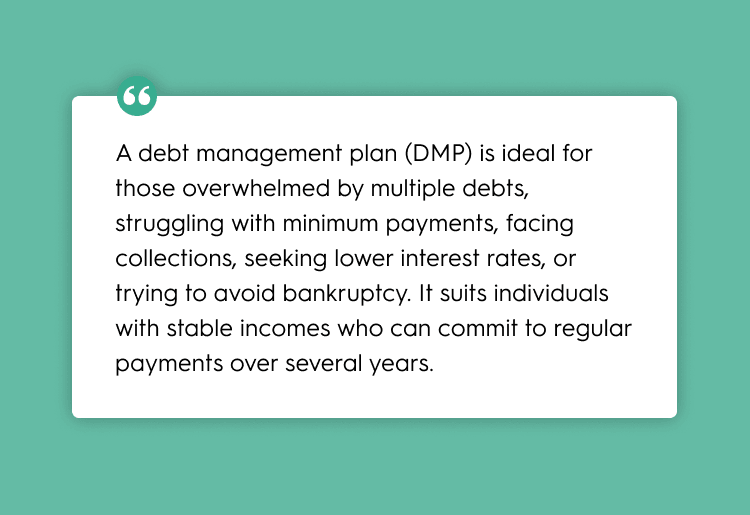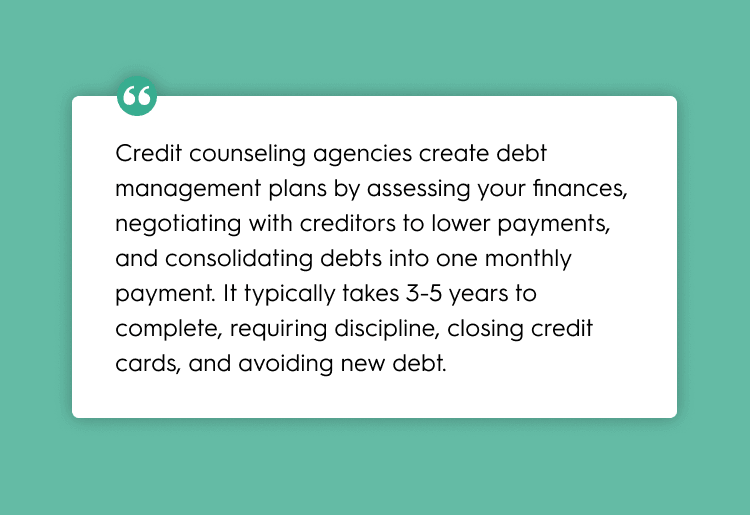
DMPs work by simplifying unsecured debts, such as credit cards or medical bills, into one monthly payment. This approach helps make debt more manageable and may even reduce interest rates.
However, DMPs are just one way to handle debt. It’s important to understand how they work, their potential benefits and drawbacks, and how they compare to other options like debt consolidation loans or debt settlement programs.
Key Insights
- Debt Management Plans (DMPs) consolidate unsecured debts, lower rates, but require closing cards and avoiding new debt.
- DMPs suit those with multiple debts, payment struggles, and stable income seeking lower rates.
- Before enrolling, assess finances, research agencies, and explore alternatives like loans.
- Choose reputable agencies, review terms, get written agreements, and trust your instincts.

What Is a Debt Management Plan?
A debt management plan is a structured program that helps you manage unsecured debts—such as credit cards, personal loans, and medical bills—through a non-profit credit counseling agency.
The agency negotiates with your creditors to lower interest rates, reduce fees, and consolidate your debts into monthly payments. You’ll pay the agency, and they’ll distribute the funds to your creditors.
What's the difference between a Debt Management Plan vs. Debt Consolidation or Settlement?
The terminology between a debt management plan vs. debt consolidation loans or even debt settlements can be confusing.
Here’s a short breakdown of what a DMP is not:
Debt consolidation loans involve taking out a new loan to pay off existing debts. With a DMP, you don’t take out a new loan; instead, you stick with your existing debts but make a single, consolidated payment to the credit counseling agency.
Debt settlement tries to reduce the total amount you owe by negotiating a partial payment with creditors. In a DMP, you pay the full amount of your debts over time but with reduced interest rates and fees.
DMPs typically run for 3 to 5 years, and while non-profit agencies organize them, there are usually setup and monthly fees involved.
![Credit counseling agencies create debt management plans by assessing your finances, negotiating with creditors to lower payments, and consolidating debts into one monthly payment. It typically takes 3-5 years to complete, requiring discipline, closing credit cards, and avoiding new debt.]() How Do Debt Management Plans Work?
How Do Debt Management Plans Work?
Credit counseling agencies do most of the leg work when it comes to making debt management plans work. In your initial consultation, your credit counselor will assess your financial situation by looking at your income, expenses, and total debt. They’ll also help you build a budget to see where your money is going and figure out how much you can realistically pay toward your debts each month.
Your counselor will negotiate with creditors to lower interest rates, waive fees, and reduce monthly payments. Keep in mind that while most creditors are willing to work with the agency, some may not agree to the new terms. After negotiations, all your debts are combined into one monthly payment, which you send to the credit counseling agency. The agency will then distribute the funds to your creditors. Your monthly payment will likely include any fees for the counseling service as well.
Even with reduced payments, it could take several years to finish the plan. During this time, your counselor will likely require you to close your credit cards to avoid taking on new debt. You should also avoid taking out new loans or credit cards while in the DMP. If you stick to the plan, make your payments, and avoid new debt, you could be debt-free by the end of your DMP.
Benefits of Enrolling in a Debt Management Plan
Debt management plans can be a lifeline if you’re struggling with debt. Here’s how it can help:
- Simplified payments: Instead of juggling multiple bills, you’ll make one easy payment to the credit counseling agency, and they’ll handle the rest. This can make budgeting and staying organized much simpler.
- Lower interest rates and waived fees: Credit counselors work directly with your creditors to reduce interest rates and waive late or over-limit fees. This can save you money and speed up your repayment.
- Structured repayment: A DMP typically lasts 3 to 5 years, giving you a clear plan to become debt-free. Just remember, staying on track with payments is key to meeting that goal.
- Credit score improvement: Your credit score may take a hit at first, especially if you close credit accounts. However, consistently making on-time payments through your DMP can help improve your score over time.
- Financial education: Credit counseling agencies don’t just handle your debt—they also provide tools and education to help you build better financial habits. These resources can set you up for long-term financial health.
- Creditor communication: Your counselor will handle the communication with creditors and collections, so you won’t have to deal with the stress of constant phone calls and letters.
- Peace of mind: Beyond the financial benefits, a DMP may provide peace of mind by giving you a clear plan to tackle your debt.
Potential Drawbacks of Debt Management Plans
While debt management plans can provide major relief if you’re struggling with debt, there are some drawbacks to keep in mind:
- Impacts on credit score: Enrolling into a DMP may cause your credit score to decrease if your creditors report to agencies that you're using a debt management service.
- No new credit: You’ll need to avoid taking on new debt while in the plan. Your counselor will likely require you to close your credit card accounts, limiting access to credit during repayment.
- Fees: Most agencies charge setup and monthly fees, which are included in your payments. These fees are usually reasonable, but make sure to work with a trusted non-profit agency.
- Not a quick fix: DMPs take 3 to 5 years to complete. It’s a long-term commitment that requires you to stick to the plan and make payments consistently.
- Not all debt applies: Only unsecured debts—like credit cards and medical bills—are eligible for the plan. Secured debts, like mortgages and car loans, won’t be included.
- Creditor participation: Not all creditors may agree to the DMP terms, meaning some debts might not be covered, and you’ll need to manage them separately.
- Commitment: Staying disciplined is crucial. Missing payments or not following through can disrupt your plan and make it harder to reach your debt-free goal.
Who Should Consider a Debt Management Plan?
A debt management plan can be a helpful option for people dealing with financial challenges, especially in the following situations:
- Overwhelmed by multiple debts: If keeping up with several payments feels chaotic, a DMP simplifies things by combining your unsecured debts into one manageable monthly payment.
- Struggling with minimum payments: If you’re only able to make minimum payments and your balances aren’t shrinking, a DMP can reduce interest rates and help you pay off debt faster.
- Facing collections: If constant calls from collections agencies are adding to your stress, a DMP can help. Your credit counselor will communicate with creditors on your behalf, reducing or even stopping those calls.
- Seeking lower interest rates: Credit counselors can negotiate with creditors to lower your interest rates, which could reduce your monthly payment or help you pay off your debt faster.
- Avoiding bankruptcy: If bankruptcy isn’t an option—or if you’re trying to avoid the long-term damage it does to your credit—a DMP could provide a structured way to manage your debt.
- Have a stable income: DMPs require you to make regular payments over several years, so they’re a better fit if you have a steady income to rely on.

Steps to Take Before Enrolling in a Debt Management Plan
Before jumping into a debt management plan, it's important to take a few key steps to make sure it’s the right solution for your financial situation:
Step 1: Assess Your Financial Situation
To properly assess your financial situation, you must account for all sources of income and monthly expenses. After gathering your information, make a budget based on the past three months' spending to see where your money is really going each month.
Step 2: Understand Your Debt
Not all debts are eligible for a DMP. Focus on unsecured debts like credit cards or medical bills. Collect details on your debts—interest rates, monthly payments, and amounts owed—so you have the full picture before moving forward.
Step 3: Research Credit Counseling Agencies
During this step, you want to ensure that the credit counseling agency you choose is reputable and accredited. Many agencies have certifications from organizations like the National Foundation for Credit Counseling or the Financial Counseling Association of America. Both of these organizations can also help connect you with a credit counselor through their sites.
Step 4: Gather Documentation
Before meeting with your credit counselor, you should collect any financial documentation you must share at the initial counseling. These documents may include pay stubs, bank statements, and debt information. This will help your counselor create a tailored plan based on your financial reality.
Step 5: Understand the Plan and Fees
In your initial counseling session, ask questions about how the DMP works, the fees involved, and the repayment timeline. Make sure you understand how fees will be factored into your monthly payment and how the plan might impact your credit score. It’s also important to know what happens if you miss a payment.
Step 7: Explore Alternatives
DMPs aren’t for everyone. Before enrolling, take the time to explore other options, such as debt consolidation loans, credit counseling without a DMP, or even bankruptcy. It’s essential to compare all your options to find what works best for you.
Alternatives to Debt Management Plans
Debt management plans aren’t the only option for tackling debt. Here are a few other alternatives that might be a better fit for your financial situation:
- Debt consolidation loans: With a debt consolidation loan, you can combine multiple debts into a single loan with one monthly payment. Just be sure the interest rate on the new loan is lower than your current rates.
- Balance transfer credit cards: These cards allow you to transfer high-interest credit card debt to a card with a lower interest rate or a 0% introductory APR. Just be cautious—if you don’t pay off the balance during the introductory period, the interest rate could spike.
- Credit counseling without a debt management plan: If you’re not ready for a formal DMP, many non-profit agencies offer budgeting advice, debt management strategies, and financial education to help you get back on track.
- Financial coaching: The smart way to repay debt is through preparation. A financial coach can work with you to create a personalized debt repayment plan and help you manage your budget. Unlike a DMP, this option focuses more on education and personal guidance without formal negotiations with creditors.
- Debt settlement: You can negotiate directly with creditors to pay less than what you owe. This option can negatively affect your credit score and usually requires a lump sum payment, and while it may offer faster results, it comes with more risk.
- Bankruptcy: There are occasions when bankruptcy is the appropriate alternative for you to either discharge or restructure your debts. Bankruptcy has long-lasting effects on your ability to get credit later on and should be considered only after consulting a legal professional.
- Community resources: Some non-profits and community organizations provide financial assistance, education, or debt management resources. If you’re in need of help, these programs might be worth exploring.
Exploring these alternatives can help you decide if a DMP is right for you or if another option is a better match for your needs.
How to Choose the Right Debt Management Plan
Choosing the right debt management plan is a big decision—it’s a years-long commitment to paying off your debt and requires careful consideration. Here’s what to look for to make sure you’re set up for success:
Choose a reputable credit counseling agency: The agency you work with will play a key role in your DMP. Look for agencies accredited by organizations like the National Foundation for Credit Counseling (NFCC) or the Financial Counseling Association of America (FCAA). Make sure they offer more than just a payment plan—financial education and personalized support are crucial for your long-term success.
Weigh the fees: Most DMPs charge setup and management fees. Some agencies offer low—or no-fee options, but always ask for a clear breakdown of the costs. Ensure the fees are reasonable and transparent before you commit.
Review the plan terms: Before deciding on a plan, carefully review the repayment timeline, interest rate reductions, and how the DMP might affect your credit score. It’s also important to confirm the agency’s ability to negotiate successfully with creditors. Don’t hesitate to ask about their track record in getting fees waived or interest rates reduced.
Get everything in writing: Once you’ve reviewed the plan's details and feel comfortable with them, ask for everything in writing. Take the time to review the documentation before signing anything. This ensures that everything discussed is accurately reflected in the final plan.
Trust your instincts: At the end of the day, trust your instincts. You should feel confident about the agency and the plan itself. If something doesn’t feel right, it’s okay to keep looking for a better fit.
Remember, the right DMP is not just about finding the right agency—it’s about making a long-term commitment to paying off your debt. Make sure you’re financially and mentally prepared to stick with it for the full term.
Bottom Line
A Debt Management Plan can be a helpful tool if you’re ready to tackle your debt and commit to a structured plan. But it’s important to go in with your eyes wide open—understand the process, weigh the pros and cons, and explore your alternatives.
Take your time, do your research, and choose a path that makes sense for your financial situation. Whether you move forward with a DMP or decide on another approach, the most important step is taking action toward getting your finances under control.

 How Do Debt Management Plans Work?
How Do Debt Management Plans Work?


